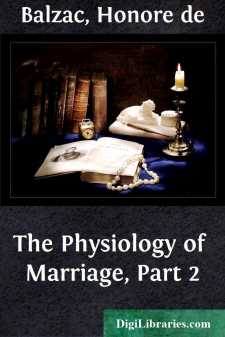Categories
- Antiques & Collectibles 13
- Architecture 36
- Art 48
- Bibles 22
- Biography & Autobiography 813
- Body, Mind & Spirit 142
- Business & Economics 28
- Children's Books 17
- Children's Fiction 14
- Computers 4
- Cooking 94
- Crafts & Hobbies 4
- Drama 346
- Education 46
- Family & Relationships 57
- Fiction 11829
- Games 19
- Gardening 17
- Health & Fitness 34
- History 1377
- House & Home 1
- Humor 147
- Juvenile Fiction 1873
- Juvenile Nonfiction 202
- Language Arts & Disciplines 88
- Law 16
- Literary Collections 686
- Literary Criticism 179
- Mathematics 13
- Medical 41
- Music 40
- Nature 179
- Non-Classifiable 1768
- Performing Arts 7
- Periodicals 1453
- Philosophy 64
- Photography 2
- Poetry 896
- Political Science 203
- Psychology 42
- Reference 154
- Religion 513
- Science 126
- Self-Help 84
- Social Science 81
- Sports & Recreation 34
- Study Aids 3
- Technology & Engineering 59
- Transportation 23
- Travel 463
- True Crime 29
Honore de Balzac
Honoré de Balzac was a prominent French novelist and playwright known for his extensive and detailed depiction of society in early 19th-century France. He is best known for "La Comédie Humaine," a series of over 90 interlinked novels and stories that explore a wide range of characters and social classes. Balzac's keen observations and complex characters significantly influenced the development of realism in literature.
Author's Books:
Sort by:
by:
Honore de Balzac
THE UNKINDEST CUT OF ALL. Is it a petty or a profound trouble? I knew not; it is profound for your sons-in-law or daughters-in-law, but exceedingly petty for you. "Petty! You must be joking; why, a child costs terribly dear!" exclaims a ten-times-too-happy husband, at the baptism of his eleventh, called the little last newcomer,—a phrase with which women beguile their families. "What...
more...
by:
Honore de Balzac
A TREATISE ON MARITAL POLICY. When a man reaches the position in which the first part of this book sets him, we suppose that the idea of his wife being possessed by another makes his heart beat, and rekindles his passion, either by an appeal to his amour propre, his egotism, or his self-interest, for unless he is still on his wife's side, he must be one of the lowest of men and deserves his fate....
more...
by:
Honore de Balzac
I. LOUISE DE CHAULIEU TO RENEE DE MAUCOMBE. PARIS, September. Sweetheart, I too am free! And I am the first too, unless you have written to Blois, at our sweet tryst of letter-writing. Raise those great black eyes of yours, fixed on my opening sentence, and keep this excitement for the letter which shall tell you of my first love. By the way, why always "first?" Is there, I wonder, a second...
more...
by:
Honore de Balzac
THE UNKINDEST CUT OF ALL. Is it a petty or a profound trouble? I knew not; it is profound for your sons-in-law or daughters-in-law, but exceedingly petty for you. "Petty! You must be joking; why, a child costs terribly dear!" exclaims a ten-times-too-happy husband, at the baptism of his eleventh, called the little last newcomer,—a phrase with which women beguile their families. "What...
more...
by:
Honore de Balzac
STUDY OF A WOMAN The Marquise de Listomere is one of those young women who have been brought up in the spirit of the Restoration. She has principles, she fasts, takes the sacrament, and goes to balls and operas very elegantly dressed; her confessor permits her to combine the mundane with sanctity. Always in conformity with the Church and with the world, she presents a living image of the present day,...
more...
by:
Honore de Balzac
CHAPTER I. A BEDROOM OF THE SIXTEENTH CENTURY On a winter's night, about two in the morning, the Comtesse Jeanne d'Herouville felt such violent pains that in spite of her inexperience, she was conscious of an approaching confinement; and the instinct which makes us hope for ease in a change of posture induced her to sit up in her bed, either to study the nature of these new sufferings, or to...
more...
by:
Honore de Balzac
CHAPTER I. JUDAS The autumn of the year 1803 was one of the finest in the early part of that period of the present century which we now call "Empire." Rain had refreshed the earth during the month of October, so that the trees were still green and leafy in November. The French people were beginning to put faith in a secret understanding between the skies and Bonaparte, then declared Consul for...
more...
by:
Honore de Balzac
INTRODUCTION The Histoire des Treize consists—or rather is built up—of three stories: Ferragus or the Rue Soly, La Duchesse de Langeais or Ne touchez-paz a la hache, and La Fille aux Yeux d'Or. To tell the truth, there is more power than taste throughout the Histoire des Treize, and perhaps not very much less unreality than power. Balzac is very much better than Eugene Sue, though Eugene Sue...
more...
by:
Honore de Balzac
MELMOTH RECONCILED There is a special variety of human nature obtained in the Social Kingdom by a process analogous to that of the gardener's craft in the Vegetable Kingdom, to wit, by the forcing-house—a species of hybrid which can be raised neither from seed nor from slips. This product is known as the Cashier, an anthropomorphous growth, watered by religious doctrine, trained up in fear of...
more...
by:
Honore de Balzac
PREFACE This little Parisian silhouette in prose was written by Balzac to be the first chapter of a new series of the "Comedie Humaine" that he was preparing while the first was finishing. Balzac was never tired. He said that the men who were tired were those who rested and tried to work afterwards. "A Street of Paris and its Inhabitant" was in its author's mind when Hetzel,...
more...











